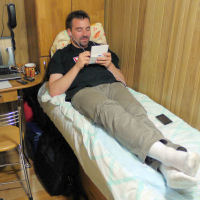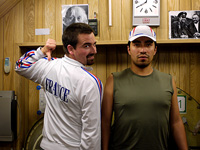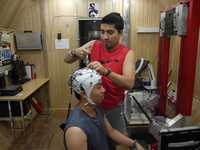C
csmyth3025
Guest
I don't know whether the 520-day mock mission qualifies a bona fide "mission" in the context of this thread, but it seems like it should qualify to me. The article on this can be found in the Space.com site at: http://www.space.com/news/record-settin ... 00603.html
This is seems to be a serious and well supported scientific endeavor seeking to answer questions about the physiological and psychological effects of a long-term trip in space (to Mars) as well as possible technologies that might be utilized.
Although this is, as far as I know, the first such long-duration mock spaceflight (it has been preceded by a 14 day and a 105 day simulation conducted by the same Mars500 project, a joint experiment by Russia, the European Space Agency and China), I would think that pertinent lessons from (nuclear) submarines, antarctic bases, the MIR space station and the ISS have been applied to and incorporated in this experiment. Based on the history of select crews living and working in confined environments, does anyone think any insurmountable problems will be encountered in this experiment?
This simulation is necessarily conducted in a 1-g environment, since it's Earth-based. Does anyone know if a real trip to Mars is intended to provide some level of artificial gravity by spinning the habitat modules?
On a related question, does anyone know if living in the 1/6-g environment of the moon produces the same detrimental effects of living in the zero-g environment of the ISS?
Chris
This is seems to be a serious and well supported scientific endeavor seeking to answer questions about the physiological and psychological effects of a long-term trip in space (to Mars) as well as possible technologies that might be utilized.
Although this is, as far as I know, the first such long-duration mock spaceflight (it has been preceded by a 14 day and a 105 day simulation conducted by the same Mars500 project, a joint experiment by Russia, the European Space Agency and China), I would think that pertinent lessons from (nuclear) submarines, antarctic bases, the MIR space station and the ISS have been applied to and incorporated in this experiment. Based on the history of select crews living and working in confined environments, does anyone think any insurmountable problems will be encountered in this experiment?
This simulation is necessarily conducted in a 1-g environment, since it's Earth-based. Does anyone know if a real trip to Mars is intended to provide some level of artificial gravity by spinning the habitat modules?
On a related question, does anyone know if living in the 1/6-g environment of the moon produces the same detrimental effects of living in the zero-g environment of the ISS?
Chris








